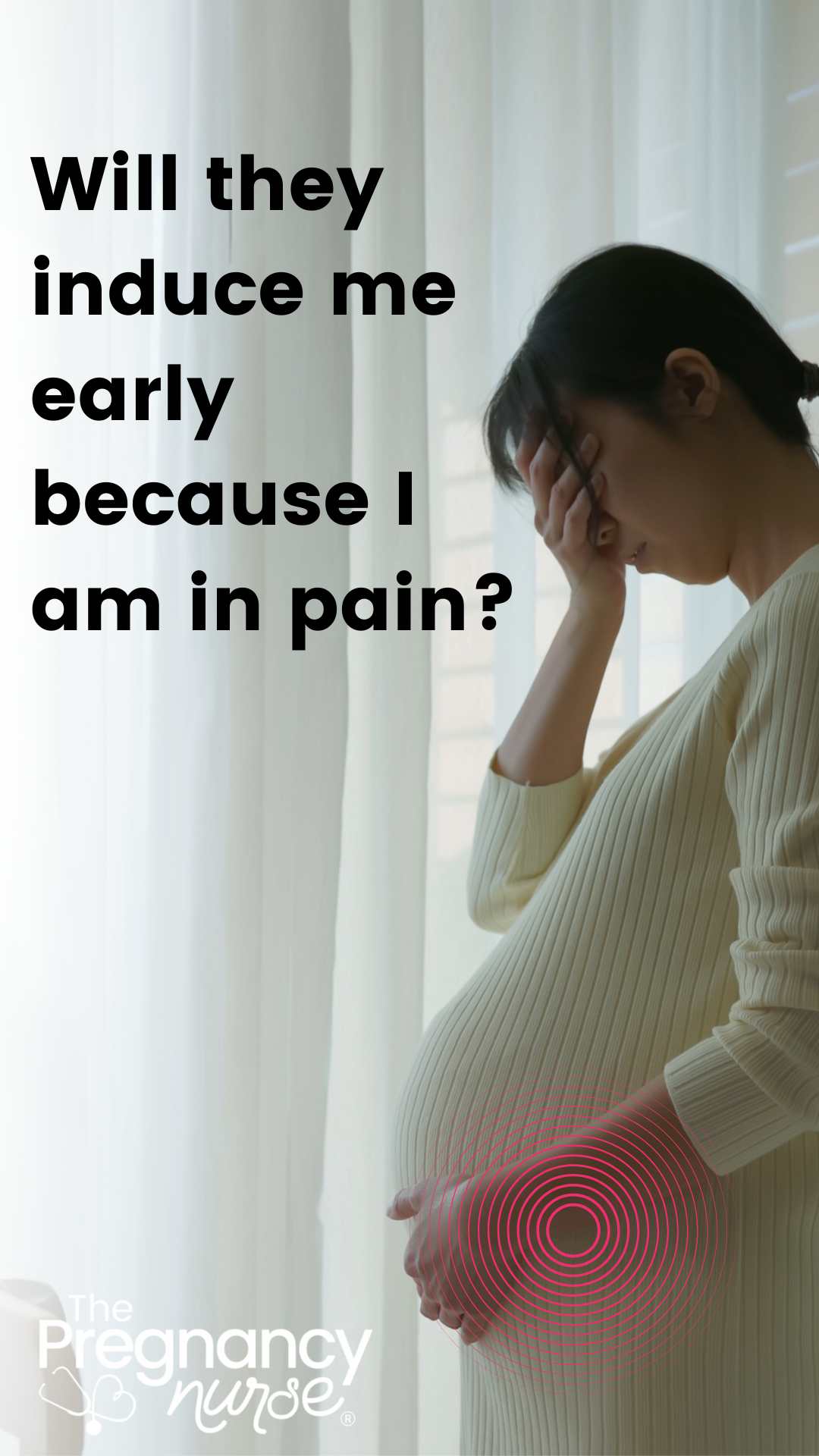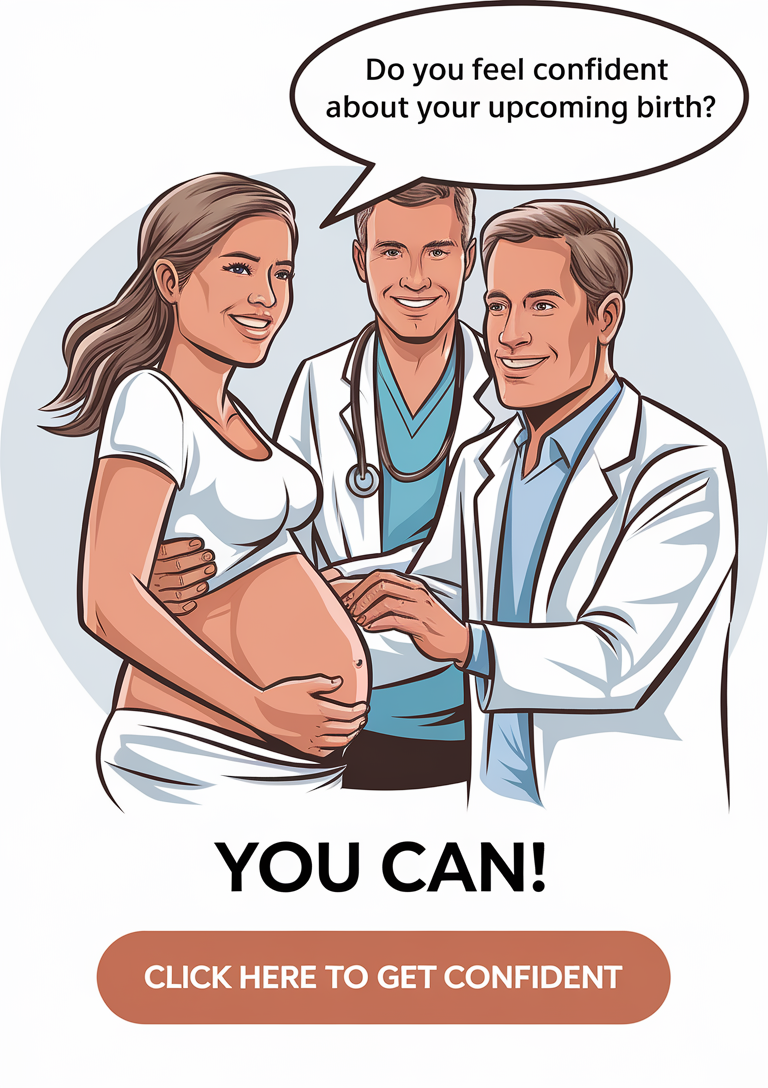Pregnancy can be very painful, and many people find the last month of pregnancy extremely painful due to the demands on their body, most especially their abdomen and pelvis. So, can a person be induced early because they are in pain? Let’s find out

Before we get going, I just wanted to say that around The Pregnancy Nurse® we get it. Pregnancy is NO fun at the end. I am in no way lessening the pain that you are feeling, I’m just here to give you the facts. After being a nurse since 1997 with 20 years of labor and delivery experience, I think that’s the best thing I can do for you.
The best thing you can do is to make sure to communicate with your doctor and your family about your needs. Communication is key which is why I recommend this — it includes partners and has a whole bonus video on provider communication to feel more comfortable in that situation!
Ok, let’s answer the big question:
Can I Be Induced Early Because of Pain?
In most cases, no. Prior to 39 weeks of pregnancy there must be a medical reason for your provider to order an induction. Hospitals have placed a lot of stop-gap measures to stop early inductions. Doctors must have a leapfrog code in order to schedule an induction prior to 39 weeks.
Those codes are for:
- Issues with the baby found on ultrasound (baby not growing, low fluid, etc)
- Premature rupture of membranes (your water breaks early)
- High blood pressure (hypertension) or preeclampisa
- Maternal medical conditions (problems with your kidneys or heart)
- Diabetes (both gestation and otherwise)
And that’s about it. Within each of these there is a wide variety of issues but they are fairly restrictive.
When scheduling an induction your doctor needs a diagnosis code that falls within these “leapfrog codes”. That is a hospital policy…. but let’s talk about why….
I also have a whole other post on if you can ask to be induced at 37 weeks.
What’s Bad About Early Inductions: A history
You may have had friends, sisters or a mom who was able to be induced early, but that all changed in the early 2010’s.
Because I have been a nurse for so long I have seen doctors try to induce 34-39 week patients for reasons that seemed “off”. Patients were tired, and ready to be done and the doctors wanted to keep them happy, so they would schedule the induction.
However, induction prior to 39 weeks shows a need for increased interventions which can be:
- Time in the NICU for baby (because they weren’t developed enough to be born yet)
- Lifelong issues for babies due to the early birth
- Cesarean Sections for moms due to failed inductions
- Long inductions which may results in postpartum hemorrhage
So, in 2011 the Leapfrog group introduced a toolkit to help doctors and hospitals not deliver patients prior to 39 weeks unless there was a serious reason.
Of course, it took a while for these codes to actually be used in practice, but hospitals now are very strict on who can and who can not have an induction. This is enforced by JACHO or their state inspection organization that can look through their books to see the codes patients had in order to be induced.
You can see their toolkit here (the reasons for induction are on an orange charge on page 4).
BTW, if you’re 37 weeks, have you taken a prenatal class yet? It’s not too late. So many couples say this one was “fun” and helped them relax a lot!
Why Isn’t Pain a Reason for an Early Induction?
In general, patients with “pain” during pregnancy aren’t given a diagnosis. It’s hard to actually prove why someone is having pain and if their pain is actually worse than the regular pains of pregnancy.
If your pain was due to an enlarged liver (from preeclampisa) or your kidneys not functioning then that would be a diagnosis they could use. But generalized pain is not.
Frankly, that part is annoying. I feel like we’re just told to suck it up in those last few weeks. While I agree that an early induction might not be the best option, I feel like there should be something.
Can You Deliver Early with SPD or PGP? (symphysis pubis dysfunction or pelvic girdle pain)
They aren’t listed as one of the options. Mostly because it doesn’t effect you or the baby’s health they do not believe it is a reason to be induced. I would definitely talk with your provider about it if you have a diagnosis of SPD, guidelines are always change.
What CAN I do for pain during pregnancy?
I think this is the bigger question. Many people are in agony from their SPD or other pregnancy-related issues. Most often you can’t (or don’t want to) take the narcotics that might be given to someone else who’s broken their pelvis — so what can you do?
This is the true question for your provider. If you are experiencing extreme amounts of pain that affecting your activities of daily living your provider should be thinking of things that can help the pain, even if they aren’t able to induce you. At no point is “that’s just part of pregnancy” an OK response to severe pain.
There are a few things that people have found helpful:
Go on Maternity Leave Early from Work
Many people’s work only makes their pains even worse. I know that this can be a hard choice as many families need the money and that’s why they work. I understand this isn’t an option for a lot of people, but it is valid and your provider should be willing to sign a work release if needed to get you out of work in that last month of pregnancy if you need it.
Of course, that note won’t guarantee pay. Maternity leave is a whole other bag of chips – but you have to take what you have and decide what is best for you.
If this seems like it’s not an option definitely check out my other recommendations:
Get Physical Therapy
Beyond work, there are likely things that you are doing in your everyday life that are making your pain worse. For me, it was how I put on pants, or got out of the car. Any time I was separating my legs to do something it made it worse. I somehow ignored that and just kept doing those things anyway.
It is a physical therapist’s job to help us adjust everyday movements to hurt less. They may also have some other practices you can do that can help you feel better or help your body relax when not in use.
Go to a Chiropractor
Seeing a chiropractor can really help your pelvis, along with those muscles and ligaments along your pelvis.
The annoying thing is that all chiropractors may say that they are trained in pregnancy. However, look for a doctor who is specially trained in the Webster Technique. That is special training specific to your special needs during pregnancy.
I had a chiropractor on my podcast and I share some links on how to find one on that page.
Use a Pelvic Belt
These can be VERY helpful for pelvic girdle pain.
I had severe SPD which was made WORSE by wearing loose scrubs that didn’t help support my pelvis at all. You can use a pelvic support belt that can give your pelvis the support it needs while all of it is relaxing due to pregnancy hormones.
Think of it as though your pelvis has gotten lazy, and you’re just giving it some backup.
Talk with your doctor about if it is right for you, and how to best wear it. This is different than something that supports your belly as it is worn lower on the hips.
Use Belly Bands or Kinesiology Tape
If your problem is more your abdominal ligaments just screaming when you move, cough, sneeze, or turn — a belly band may help those out.
The idea here is that they support your abdomen from below. I have a whole post about how to wear a belly band and that also explains a bit about Kinesiology tape (and a study where it was found to be effective). There are also belly straps that may even have suspenders to help distribute your abdominal weight across your whole body.
When can you be induced?
It may help for you to find out when you can be induced. The arrive trial showed that an induction of labor at 39 weeks may actually have decreased complications. Which means that an elective induction (meaning there is no medical reason) can be offered at 39 weeks.
The bad news is that some hospitals are so busy they don’t take elective inductions until 40 (or beyond) weeks gestation.
So, talk with your provider about when you CAN be induced with what you have going on. Having an “end date” may help you mange better for a few weeks.
Do Less
The reality is that those last few weeks a pretty miserable for everyone. That isn’t to say that your pain isn’t valid. I mostly just think that as a society (and especially as a partner) we need to allow those people to have a break in that last month. They just do the activity that is absolutely necessary, and others pick up the slack elsewhere.
That may mean:
- Not making dinner
- Asking friends/family to watch other children
- Getting a nap in daily
- Letting kids watch more TV
- Playing with kids on the couch rather than going to the park
For too long we have ignored the pain of pregnancy. I honestly don’t think that an early induction is the answer because of the studies that have showed adverse outcomes (read about them on that toolkit starting at page 6). The reality is that an early induction may cause something (like a prolonged labor with a hemorrhage or possibly an unnecessary cesarean) that would be worse than what you are experiencing now.
But that doesn’t mean that you shouldn’t get help. You should be ignored, but it is also going to be up to you to figure out how you can manage for the next few weeks.
One of the BEST things you can do is at least alliviate some of your fears about delivery. Come join me in The Online Prenatal Class for Couples where we aim to get you and your partner prepared for delivery in just a few hours!
In my efforts to create the best all-in-one birth class, I just added a video on breastfeeding to the course. It really is your one stop shop for birth preparation, and I know you’re going to love the price!
Looking to get prepare for your birth? I have some easy options for you!
~~~~~~~~
– Worried you’re missing something? Grab my pregnancy planner so you don’t miss a thing!
– Thinking about an induction? Grab Inductions Made Easy to feel prepared in just 20 minutes!
– Wondering how to get that baby OUT? Grab Going Into Labor Made Easy so you know how to (and not to) do it!
– Postpartum got you anxious? Check out Postpartum Care Made Easy so you can stay SAFE even when all your attention is on that little on.
🚨 AND if ALL OF IT has got you on edge The Online Prenatal Class for Couples is perfect for you — You’ll feel so ready before you even know it!
~~~~~~~~
No matter WHERE you are at in your pregnancy journey, we have resources that can help!
And, if you’re not quite sure you’re ready for that whole thing (but seriously, if you’re close to 37 weeks, you need to get it done soon), check out my free prenatal class. It’s your first step toward getting in the driver’s seat of your birth.







 27 Weeks Pregnant: Baby Development & Position
27 Weeks Pregnant: Baby Development & Position
